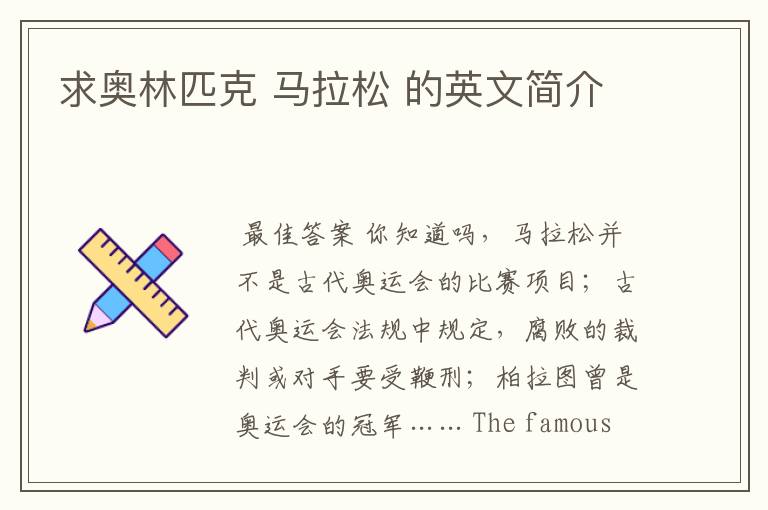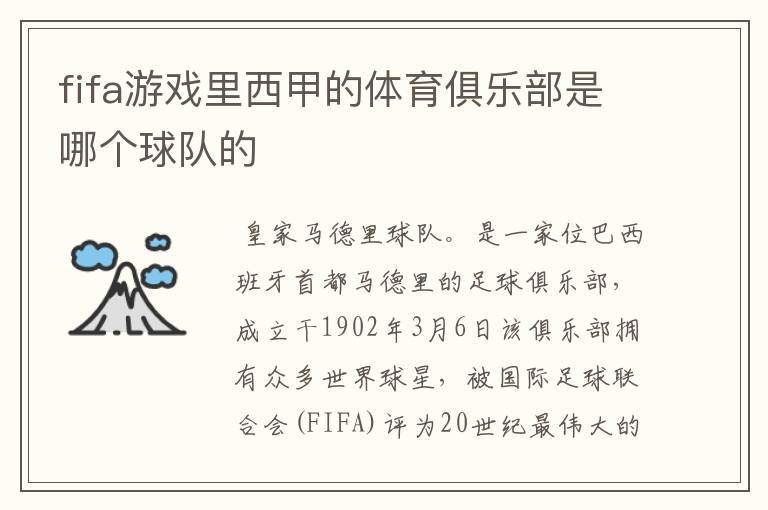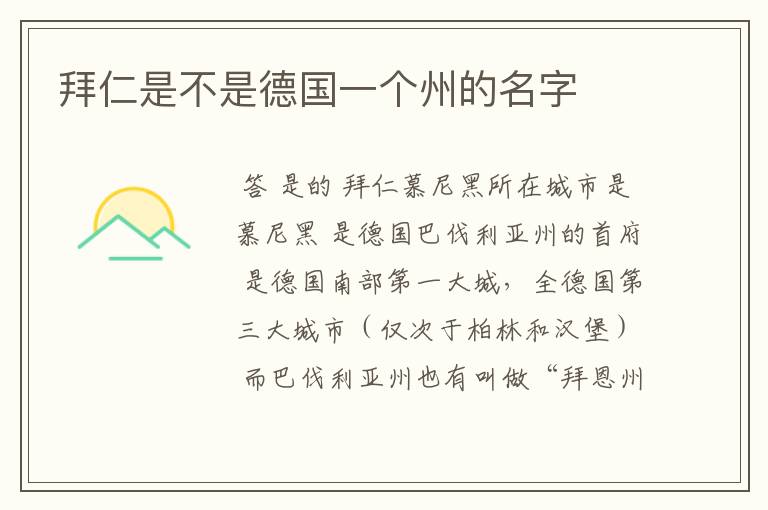〔马拉松的由来〕马拉松的由来英语
今天运困体育就给我们广大朋友来聊聊马拉松的由来,希望能帮助到您找到想要的答案。
求奥林匹克 马拉松 的英文简介

最佳答案你知道吗,马拉松并不是古代奥运会的比赛项目;古代奥运会法规中规定,腐败的裁判或对手要受鞭刑;柏拉图曾是奥运会的冠军……
The famous marathon race did not exist in the ancient Games. The starting pistol of the first Olympic marathon was fired on 14 April 1896 at 2 p.m.
Famous Greeks attended, or even participated in the ancient Olympic Games: the philosopher Socrates, Pythagoras, Plato, Aristotle and even the father of medicine, Hippocrates. The philosopher Plato (427-347) was a double winner of the pankration.
The 14 articles of the Olympic regulations included an article on corruption: any corruption of a judge or an opponent would be punished by whipping.
whip v. 鞭打,抽打
marathon n. 马拉松
Socrates, Pythagoras, Plato, Aristotle n. (古希腊哲学家)苏格拉底,毕达哥拉斯,柏拉图,亚里士多德
求马拉松发展历程(英文)
最佳答案维基百科中的马拉松历史:
The name Marathon comes from the legend of Pheidippides, a Greek messenger. The legend states that he was sent from the town of Marathon to Athens to announce that the Persians had been defeated in the Battle of Marathon,[2] which took place in August or September, 490 BC.[3] It is said that he ran the entire distance without stopping and burst into the assembly, exclaiming "Νενικήκαμεν" (Nenikékamen, 'We have won.') before collapsing and dying.[4] The account of the run from Marathon to Athens first appears in Plutarch's On the Glory of Athens in the 1st century AD who quotes from Heraclides Ponticus's lost work, giving the runner's name as either Thersipus of Erchius or Eucles.[5] Lucian of Samosata (2nd century AD) also gives the story but names the runner Philippides (not Pheidippides).[6]
There is debate about the historical accuracy of this legend.[1][7] The Greek historian Herodotus, the main source for the Greco-Persian Wars, mentions Pheidippides as the messenger who ran from Athens to Sparta asking for help, and then ran back, a distance of over 240 kilometres (150 mi)[8] each way.[9] In some Herodotus manuscripts the name of the runner between Athens and Sparta is given as Philippides. Herodotus makes no mention of a messenger sent from Marathon to Athens, and relates that the main part of the Athenian army, having already fought and won the grueling battle, and fearing a naval raid by the Persian fleet against an undefended Athens, marched quickly back from the battle to Athens, arriving the same day.
In 1876, Robert Browning wrote the poem "Pheidippides". Browning's poem, his composite story, became part of late-19th century popular culture and was accepted as a historic legend.
要更详细的还有《大英百科全书》的解释:
Marathon
Encyclopædia Britannica Article
long-distance footrace first held at the revival of the Olympic Games in Athens in 1896. It commemorates the legendary feat of a Greek soldier who, in 490 BC, is supposed to have run from Marathon to Athens, a distance of about 40 km (25 miles), to bring news of the Athenian victory over the Persians and then expired. The story of this messenger from the Battle of Marathon was later conflated with the story of another Greek soldier, Pheidippides, who ran from Athens to Sparta in advance of the fighting. Appropriately, in 1896 the first modern marathon winner was a Greek, Spyridon Louis.
In 1924 the Olympic marathon distance was standardized at 42,195 metres (26 miles 385 yards). This was based on a decision of the British Olympic Committee to start the 1908 Olympic race from Windsor Castle and finish it in front of the royal box in the stadium at London. The marathon was added to the women's Olympic program in 1984.
After the Olympic Games championship, one of the most coveted honours in marathon running is victory in the Boston Marathon, held annually since 1897. It draws athletes from all parts of the world and in 1972 became the first major marathon to officially allow women to compete. Other premiere marathons are held in London, Chicago, Berlin, New York City, Tokyo, and Amsterdam. Marathons are not held on the track but on roads, and, despite the fact that courses are not of equal difficulty, the International Association of Athletics Federations (IAAF) does list world records for the marathon and also for the half-marathon. World-record times in the marathon steadily declined over the course of the 20th century from slightly under three hours to slightly more than two hours.
It was long considered necessary for a runner to prepare for a marathon by training over that distance. At the 1952 Olympic Games, however, Czech Emil Zátopek set an Olympic record of 2 hours 23 minutes 3.2 seconds, even though he had never run the distance before. In the decades following, other first-time marathoners also won premiere events and set records at the distance. By the late 20th century, road racing, and marathon running in particular, had grown to become a recreational activity with broad appeal. Ultramarathons, which are neither Olympic nor IAAF events, are longer races based on a specific distance or an allotted time period for competition, such as a 12-hour race.
马拉松的由来 英文版的
最佳答案marathon
Long-distance footrace run on an open course of 26 miles 385 yards (42.2 km).
First held at the revived Olympic Games in 1896, it commemorates the legendary feat of a Greek soldier who is said to have run from Marathon to Athens in 490 BC, a distance of about 25 mi (40 km), to report the Greek victory at the Battle of Marathon, after which he dropped dead. Marathons today are usually open events for both men and women, often run by thousands of participants, including the venerable Boston Marathon (established 1897). The women's marathon became an Olympic event in 1984.
马拉松
户外长距离赛跑,全程42,195千米。1896年在恢复的奥运会中首次举行马拉松比赛。据说公元前490年,一名希腊士兵自马拉松奔跑大约40千米到雅典,报告希腊在马拉松战役获胜的消息,随后倒毙。马拉松赛即纪念此事。现代马拉松比赛男女都可以参加,通常有数千名参赛者,包括历史悠久的波士顿马拉松赛(始于1897年)和纽约马拉松赛。女子马拉松赛1984年成为奥运会比赛项目。
马拉松英语怎么读
最佳答案马拉松英语是marathon
拓展:马拉松最初是古希腊的一项赛跑比赛,后来在现代得到了广泛的发展和推广,成为了一项全球性的体育盛事。马拉松赛事通常距离为42.195公里,是一项极具挑战性和耐力性的体育运动
马拉松的起源和名称源于希腊传说中的一个故事,据说公元前490年,希腊军队在马拉松平原上击败了波斯军队,一个士兵奔跑了42.195公里传递胜利消息,然后倒下去死了,他的英勇事迹被后人传颂不衰,成为了马拉松比赛的起源。如今,马拉松已成为了一项全球性的体育盛事,吸引着来自世界各地的跑者和观众参与和观赏
马拉松的英文
最佳答案马拉松的英文:Marathon。
马拉松(Marathon)是一项源自古希腊的长跑赛事,也是世界上最具代表性和历史悠久的长跑比赛之一。现代马拉松赛事通常指的是42.195公里的长跑比赛,成为了世界各地运动爱好者和专业运动员争相参加的体育盛事。
一、起源和历史:
马拉松的起源可以追溯到公元前490年,希腊城邦雅典与波斯帝国的战争中。据传说,一位名叫菲迪皮德斯的古希腊士兵奔跑了约42公里,从马拉松地区传递战报到雅典,告知雅典人他们战胜了波斯军队。他完成任务后,因疲劳过度而倒地,成为了马拉松传奇的起点。这个故事激发了马拉松这项长跑赛事的起源。
二、马拉松赛事的发展:
马拉松赛事的形式和规模在过去的世纪中发生了巨大的变化。现代马拉松比赛始于20世纪初,第一届现代奥运会(1896年)中就有了42.195公里的马拉松赛。随着奥运会和其他大型体育赛事的发展,马拉松赛事逐渐普及,并在全球范围内得到推广。
三、马拉松的吸引力:
挑战和成就感:马拉松是一项对身体耐力和意志力的极大挑战。完成42.195公里的长跑是运动员们的巨大成就,也是对自身意志力的极大考验。
健康和锻炼:参加马拉松锻炼了人们的心肺功能、耐力和肌肉力量,有助于改善身体健康和增强体魄。
社区和友谊:马拉松赛事通常吸引来自世界各地的选手参加,成为了各种文化和背景的人们相聚的机会,也促成了友谊和社区团结感。
慈善事业:很多马拉松赛事与慈善机构合作,参赛者可以通过募集赞助款项为慈善事业出一份力,使马拉松赛事更具社会意义。
四、世界知名马拉松赛事:
波士顿马拉松:始于1897年,是世界上最古老的现代马拉松比赛之一。
伦敦马拉松:成立于1981年,是世界马拉松大满贯(World Marathon Majors)系列赛事之一,吸引了世界顶级选手。
纽约市马拉松:始于1970年,是世界上最大规模的马拉松比赛之一,每年吸引超过五万名参赛者。
柏林马拉松:成立于1974年,以其平坦的赛道和创造世界纪录的机会而闻名。
今天的内容先分享到这里了,读完本文《〔马拉松的由来〕马拉松的由来英语》之后,是否是您想找的答案呢?想要了解更多,敬请关注www.zuqiumeng.cn,您的关注是给小编最大的鼓励。
本文来自网络,不代表本站立场,转载请注明出处:https://www.zuqiumeng.cn/wenda/66112.html




